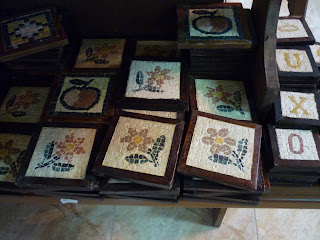Urry’s notion of
the tourist gaze privileges the vision as the outstanding form of tourist experience,
and thereby neglects other senses that are equally part of the touristic adventures.
The embodiment approach emphasizes
bodily sensations as an important part of perception within our touristic
activities.[1]
Sometimes the physical feeling is the most important component itself. For
example in “muscular” tourism such as mountain-biking.
In my recent
experience, feeling played the
dominant component as the beautiful view
at the Dead Sea ranks far below the physical
experiences I enjoyed when floating on the salty lake. I remember very well other
physical sensations such as the daily heat; the relief of the air-conditioning;
the touch of warm sand or cold water; the warm carpet and the calmness inside
the King Abdullah I Mosque; the delight of Jordanian food, especially the
warmth and taste of Tabun, Bedouin bread or “Jordanian Pizza” as Omar calls it.
“Tourism is an
emotional affair”[2] Our tourist
experiences are lived through emotions
such as fun, fear, excitement, joy, etc. Indeed, I have the most vivid memories
that are the strongest connected to emotions and affects.
More than the
visual and the pure physical, certain tourist objects – passports, cameras, vehicles, tour guides, dictionaries,
– are part of shaping the tourist experience as their presence or their form
influences the quality of the tourist experience. The objects bear qualities
that facilitate our movement, interaction and comfort.[3]
Moreover, souvenirs play an important role. They can have the meaning of a ‘piece of culture to take home’.
I realized that for
me, souvenirs and photographs are a way of holding on to the experience, to
preserve the memories visually
rather than only in my head. Hence, the visual is undeniable important, and it
is supportive for our memories of sensations,
feelings and emotions.
[1] Edensor, T. “Tourism.” Manchester
Metropolitan University, Manchester, UK. (2009): 308-309.
[2] Dorina Maria Buda,
Anne-Marie d’Hauteserre and Lynda Johnston, 'Feeling And Tourism Studies', Annals of Tourism Research 46 (2014):
103.
[3] Edensor, T. “Tourism.” Manchester Metropolitan
University, Manchester, UK. (2009): 309.
 |
| Floating sensations on the Dead Sea |
 |
| Jordanian souvenirs…- |
 |
| -… a piece of culture to take home |
No comments:
Post a Comment